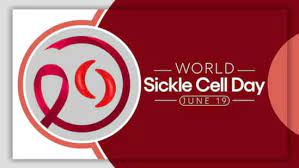AS the world marked World Sickle Cell Day on June 19, we are reminded of the urgent need to eradicate this devastating inherited blood disorder. Recognized by the United Nations since 2008, this day underscores the global imperative to address one of the world’s leading genetic diseases. This year’s theme “Hope Through Progress: Advancing Care Globally,” aptly reflects the urgent need to enhance the quality of care and ultimately eradicate SCD.
Sickle cell disease is an inherited blood disorder that primarily affects haemoglobin, the molecule in red blood cells responsible for carrying oxygen throughout the body. The disease causes red blood cells to become rigid and sickle-shaped, leading to blockages in blood flow and oxygen delivery. These blockages can result in severe pain, organ damage, and increased risk of infection. According to the Centers for Disease Control and Prevention (CDC), SCD remains a significant public health concern, particularly in regions like Sub-Saharan Africa, where the disease is most prevalent.
In Nigeria, the burden of sickle cell disease is especially heavy, with millions of people either living with the disease or carrying the sickle cell trait. The impact of SCD extends beyond individual suffering, affecting families, communities, and the healthcare system at large. As we mark World Sickle Cell Day, it is imperative to reflect on the progress made and the steps needed to eradicate this disease.
One of the most notable advocates for sickle cell disease in Nigeria has been Dame Edith Okowa, the former First Lady of Delta State. Through her 05 Initiative, she spearheaded the establishment of 25 sickle cell clinics and a referral centre at the Asaba Specialist Hospital (ASH). These clinics have provided much-needed care and support to individuals with SCD, setting a powerful example for others to follow. The impact of such initiatives cannot be overstated; they provide a lifeline to those in need and bring hope to countless families.
Despite these efforts, much more remains to be done. The fight against sickle cell disease requires a multi-faceted approach that includes improved medical care, increased public awareness, and robust research into new treatments and potential cures. On this World Sickle Cell Day, we must recommit to these efforts and work collectively to ensure a future free from the pain and suffering caused by SCD.
Firstly, access to quality medical care is paramount. Many individuals with sickle cell disease in Nigeria and other parts of the world lack access to adequate healthcare. This can result in delayed diagnosis, poor disease management, and preventable complications. Governments and healthcare providers must prioritize the development and maintenance of specialized clinics, like those initiated by Dame Edith Okowa, to ensure that all patients have access to comprehensive care. This includes regular health check-ups, pain management, and treatment of complications such as infections and organ damage.
Moreover, there is a critical need for public awareness campaigns to educate communities about sickle cell disease. Misconceptions and stigma surrounding SCD can lead to social isolation and discrimination against those affected. By increasing awareness, we can foster a more supportive environment and encourage individuals to seek timely medical advice and genetic counseling. Schools, community centers, and religious institutions can play a pivotal role in disseminating information about the disease and promoting understanding and acceptance.
Research is another crucial pillar in the fight against sickle cell disease. Advances in medical research have the potential to transform the lives of those living with SCD. In recent years, there have been promising developments in gene therapy, which offers the possibility of a cure by correcting the genetic defect responsible for the disease. Also, advancements in medicine have allowed hitherto medically incompatible couples to bear children devoid of the disease. Investment in research and development is essential to bring these breakthroughs from the laboratory to the bedside. Governments, private sector partners, and international organizations must collaborate to fund and support cutting-edge research initiatives.
International cooperation and support are also indispensable in this endeavor. Sickle cell disease is a global health issue, and a coordinated international response is needed to combat it effectively. The United Nations’ recognition of SCD as a public health threat underscores the importance of global solidarity in addressing the disease. By sharing knowledge, resources, and best practices, countries can work together to develop effective strategies and interventions.


